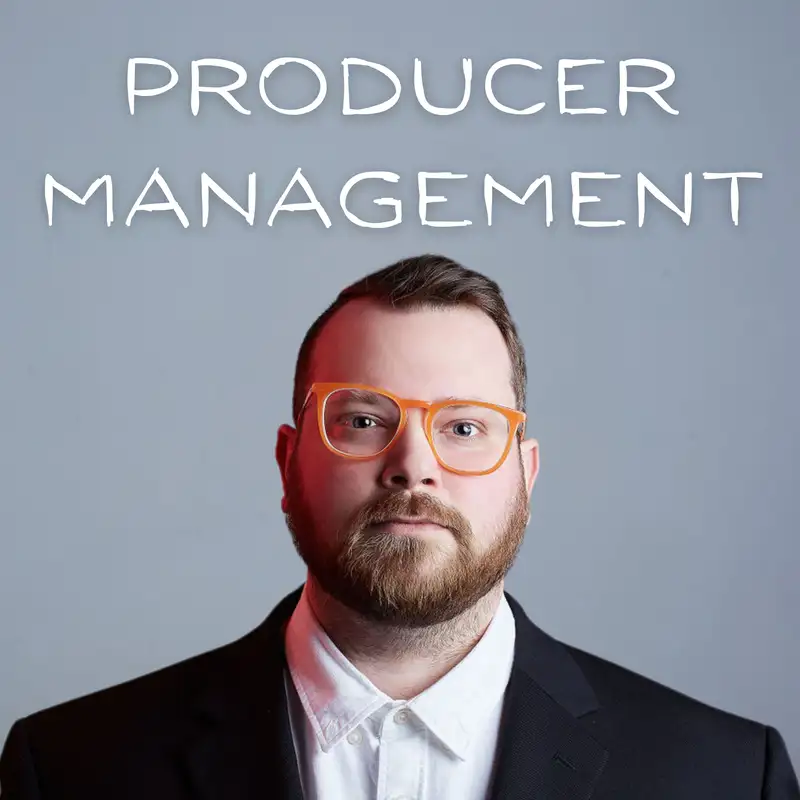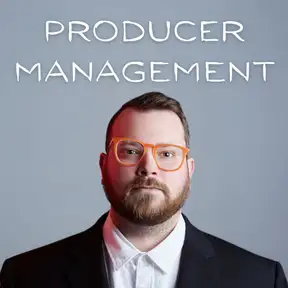
The $100K Producer Ceiling (And How to Break It)
So your problem is, is because you don't have yeses or nos on things, there's some anxiety around the schedule and everything coming in at once or nothing coming in. Yeah, living in purgatory. Are you worried about them saying yes and then not being able to get in? Are you worried about you being slammed or running out of money? Hey everyone, Daniel Grimmett here.
You're listening to Producer Management, the podcast that lets you in on real conversations between professional music producers and their teams. The deals, the strategies, and the unfiltered advice. This show is brought to you by my company, Dark Label Music.
When producers want clarity, strategy, and growth, they call us. We're hired as a strategic partner, part management, part creative and business development, designed for the realities of being a music producer right now. So whether you're a small studio or a Grammy-winning veteran, reach out to us at darklabelmusic.com to see if we can help.
Hey everybody, I've been on summer holiday, so it's been a few weeks since you've heard from me, but I've got a banger episode for you today. The majority of successful freelance music producers that I work with eventually hit a ceiling. They've figured out how to consistently book clients, charge solid rates, and they're making good money, like $80,000 to $120,000 per year.
But then they reach this crossroads where they want to diversify their income and scale just beyond trading time for money. The problem is, before you can successfully diversify, you need rock-solid systems in your core freelance business. Because if your foundation isn't structured properly, any attempt to scale will crush you under the weight of operational chaos.
This is exactly where today's producer finds himself. He's a Grammy-nominated mixer and producer who's built a solid freelance business, but he's dealing with what I call pipeline anxiety. That constant stress of not knowing if all of your pending projects will convert all at once, leaving you overwhelmed, or if none of them will, leaving you scrambling to go find new work.
So I want to show you how we work through some of this in real time. I'm going to play you a clip from a call I had with this producer where you'll hear him trying to sort through this exact challenge, and then you'll hear the specific strategies I give him to create structure that can handle growth without everything breaking down. And before I do, a quick side note.
In this clip, you will keep hearing him say columns. What he's referring to is an exercise where you make three columns. Stuff you love doing, stuff you hate doing, and stuff you feel neutral about doing.
This is how we determine what to take off your plate and in what order. I can do an entire episode on this in the future, but I just wanted to mention it up front so that you have some context and you're not wondering what the hell he's even talking about when he's saying columns. This clip also ends with us using AI to gain clarity on some of our ideas.
I assume that most of you listening to this are doing that by now, but if you're not, I recommend trying it. Here's the clip. One thing that I think I added into my offer, and I can send over my offer template right now if you want to see it as well too.
I put it into Google. I kind of, I think, stole yours of what you had like the offer validity to where like a 30-day thing, which basically says like, hey, you know, if you come back in two months, like we're going to have to talk about, or the rates could be, or it could be busy, you know, like, so don't just like, kind of giving a little bit of urgency with it, you know. So that was like a question.
The other thing is, uh, pending deposits. Of course, I haven't started working on some stuff, but I have a couple, you know, verbal yeses. And it's like, cool, you know, and trying to get like, you know, and I let them know on the call too, like just to let you know this project isn't official until the deposit has been paid.
So once we can lock that in, I can lock you into the whole schedule and everything. I think you're doing it right. I mean, what's, what, what do you feel? What is the, if you could boil this down to, my problem is X or the problem I'm trying to solve is X in one sentence.
What is it? My problem is I am kind of, uh, sitting around twiddling my thumbs and I have, I'm looking at it right now, seven, three, uh, project depend, uh, deposit pending projects or proposal set to where let's say if half of them come in or more than half of them, I'm going to be swamped at that point. It's like, I think it'll be better if I keep doing the outreach in a couple of months to where I'll have so many things on my plate that I won't have to worry about. And like maybe even pushing people back.
So your problem is, is because you don't have yeses or nos on things, there's some anxiety around the schedule and everything coming in at once or nothing coming in. Yeah. Living in purgatory.
Well, yeah, for sure. Is it more of a worry for you or for them? Are you worried about them saying yes and then not being able to get in? Are you worried about you being slammed or running out of money? I'm not worried. I mean, there is like the subconscious worried about money, but like, I shouldn't be worried because it's like, I already have enough projects that I know are going to come through the next month.
Then it's either you're worried about being slammed or you're worried about them being ready and then not being able to start immediately. So one of those, probably the, the lab, the second, in the sense that like I, for instance, the one that the new client that I got on, they actually appreciate it because I also sent them out a project timeline because they want to have the song completed by April 11th. Right.
I'm like, cool. So here's the thing. And I gave them like a timeline.
This is when we're doing this, this and this. And right now it's coming up. It's only been five days, but they haven't sent the deposit.
So it's like, if it goes two weeks, it's like, well, I'm not going to start worrying on it. Now this deadline has to go back because you guys didn't start type of a thing. Yep.
Under the offer offer, Val, uh, validity section, you could just put like, you know, Hey, my products are first come first serve. Okay. You know, or, or my time, my bookings are first come first serve.
So then that way, if they come back and like, yeah, cool. We're ready to go. It's like, awesome.
Let's look at a date. This is my next availability. That's okay.
Think about it. If you want to go get some therapists, you ain't getting in their fucking office tomorrow. You'd be lucky getting there three months.
Yeah. Cause they don't work on your schedule. You work on their schedule technically, right.
Or a doctor or anything like that. So you can look at it the same way, unless you want to have a production team. I do want to have a production team and it's actually been beneficial of, you know, that's where to go to the three columns.
One of the things that I'm very much enjoying is biz development of just like, uh, I have a couple of different guys that I am working with that are, uh, able to do some production work and stuff for me, which has been very helpful in alleviating the assistant thing has really worked out great. You know, especially on a lot of the quote, second things that I hate, I've already been able to outsource if I need to. Which is good.
That's, I was going to have you do, I was going to have you just color code the stuff that you've already either have a system for or have outsourced. The next person that I would look to hire would be some sort of admin person, like an assistant, not necessarily a manager, but someone to deal with like emails and things like that. Uh, VA probably.
Yeah. So VA, VA, I'm sorry. Virtual assistant, virtual assistant.
Okay. Uh, yeah. Virtual assistant.
And then as weird as it is to say someone that could maybe also be on the calls with me as well, too, especially if I'm going to be double teamed, you know, do I have someone on like, to where it's like they have a manager and a person, then it's like me and someone else too, you know, that could also be taking notes as well because Oh, you'll need that. Zoom AI note takers, the best thing in the world. Okay.
Yeah. Get a paid zoom account and get the AI companion. Okay.
It's awesome. I, uh, having someone else to do on the call, unless they're in person, it's that's a pain in the ass for scheduling. Cause then you gotta like, even when like me and Aaron need to be on a zoom together with someone else, it's, it's like such a pain.
Cause it's like, well, now three people have to get it. Right. You know? Yeah.
Um, Hey, I just wanted to butt in here real quick, because at the time of this call, I was all about zooms AI companion. It had just came out. However, since then we started using a different tool for taking notes and analyzing client meetings and sales calls.
It's called fathom fathom dot video, and it's completely free. This isn't a sponsor or anything. I just wanted to update you on what I'm recommending now, back to the clip.
If you want a production team, there's two ways to look at it. There is, we take all the clients in, and then the production team is more like an assembly line and every client goes to the same assembly line. That's, that's one way to do it.
That's more how my production company did it. The next one is tier client tier, where the clients themselves are cat. You probably remember this.
They're categorized into different buckets. And then you have different people working on different tiers where you may not even touch the tier C as much, maybe the tier B or like half and half. And then tier A is kind of only you, you know? And that's, so actually this, this brings up a question I had for you.
I have a whole questions for Dan tier B or tier C, right? This is the question I have. Have you ever directly, I know this is different for your business with the consulting, but let's say this one artist comes back and she's like, well, I just can't afford $3,000. I can afford 1000.
Have you ever done for those people and explain to them the call? Well, you know, we're going to be happy to do it, but it would be a little bit different. You'd be working with one of my protégés and I would oversee everything, but he would be, you know, do you ever offer like a tier B client? If there's a price objection that they can't afford, that's one of the ways to do it. Um, but like, Hey, cool.
No sweat. What I'm, what I want to come up with here is a solution to still get what I feel like you need that will keep you moving forward. Um, but make it work a little bit.
So why don't I executive produce this? I got one of my side, one of my sidekicks here. That's, you know, you wouldn't call them an apprentice or an assistant or anything. Cause then you're putting them on a lower pedestal and it seems like they're getting like less, which like technically they are getting less, but you want it to be less of the offer, not the talent on it.
Right. So, and then you're still connected to it cause you're executive producing, which you are, you're overseeing it. So you say, well, I got another option.
We can look at that. We could explore as a way that we could start our working relationship together. Um, and still get you great songs to be released and, you know, work towards that, towards that goal.
Um, why don't I executive produce this? And then one of my production partners can kind of take the lead on it. And then that would be more in the, in the 1200 range. Would that be, would that be better? And they may have some questions about it.
And then you can, you just need a good analogy. Like I might go to chat GBT here and say, um, I'm a music producer. So it says, imagine you're hiring a top chef for a fancy dinner.
You could pay $3,000 to have the chef cook the meal themselves, or you could opt for a more affordable option where the chef still designs the menu, oversees the preparation, make sure everything turns out perfect, which is most restaurants. That's most restaurants. Yeah.
Uh, and you're a chef. So that's actually a great, that's a great one. Yeah.
Oh, okay. A skilled sous chef does most of the cooking. Um, you're still getting the expert.
That could be a fun one to use. I was thinking in my head, but this one's probably less relatable. Like a lot of marketing companies and like law firms do this.
Like if you call Morgan and Morgan, you're not working with Morgan. You're working with one of the 20,000 lawyers that are on their team, you know, but you still get a, it's still the brand of Morgan and Morgan. So I was going to maybe use something like that, but I, this is probably better.
Cause it's like, well, Hey, I mean, you, you know, you, uh, what's your favorite restaurant? Oh, I like whatever. You know, it's like, okay. Gordon Ramsey's whatever.
Yeah. Gordon's out there cooking it, but it's still, you still love the food, right? Yeah. I love it.
Okay, cool. Yep. Yeah.
So I don't know, something like that. If you go to producer management.com, you'll find links to jump on our newsletter, which I highly recommend because it's the perfect companion to the show. And if you enjoy what we're doing here, please leave us a five-star review or share it with a friend.
Thanks for listening. That's the episode.


